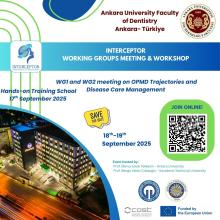Data science, Disease management & Predictive research on OPMD
Interceptor Working Group Joint Meeting & Hands on training (workshop)
The INTERCEPTOR (Interception of Oral Cancer) COST Action addresses the need for better prevention of oral cancer by transforming how oral potentially malignant disorders (OPMDs) are understood, detected, and managed. By combining cutting-edge translational research, AI-driven data science, and harmonized clinical protocols, INTERCEPTOR is paving the way toward personalized prevention strategies and improved patient outcomes across Europe.
This meeting will bring together Working Group 1 (Data Science & Medical Informatics) and Working Group 2 (Disease Care Management) to align efforts in mapping OPMD trajectories, defining temporal markers of cancer progression, and standardizing patient care across Europe.
Working Groups 1 & 2 – INTERCEPTOR: Focus, Scope & Goals
WG1 – Data Science & Medical informatics to understand OPMD trajectory
-
Leader: Prof. Rui Amaral Mendes
-
Co-leader: Prof. Dipak Sapkota and Dr Carlo Vito Caponio
Key Activities & Aims
WG1 works on improving understanding of disease trajectories in OPMD (Oral Potentially Malignant Disorders) through advanced data science and informatics. Its main goals include:
-
Analysing large healthcare datasets to map how OPMDs evolve over time (identification of progression patterns).
-
Defining temporal markers of progression toward oral cancer, to allow early detection or interception.
-
Developing predictive models (using real-world data) for patient stratification and risk assessment.
-
Integrating digital health / eHealth tools into monitoring, data capture, and patient follow-up. (Though some of that overlaps with other WGs)
WG2 – Disease care management of patients with OPMD
-
Leader: Prof. Paolo Bossi
-
Co-leader: Prof. Keith Hunter
Key Activities & Aims
WG2 focuses on the clinical side: how to improve and standardize care for patients with OPMDs.
Its main pillars are:
-
Developing standardized clinical and pathological protocols for diagnosis, treatment, and monitoring of OPMD. This includes defining histopathological criteria so that clinical assessment is consistent across Europe and beyond.
-
Improving patient pathways: how patients are assessed, followed up, and managed, including early detection and the use of AI or new tools in clinical practice.
-
Ensuring translation of research into practice: aligning clinical care with evidence from translational/preclinical research, as well as harmonizing treatment and follow-up standards across centers.




